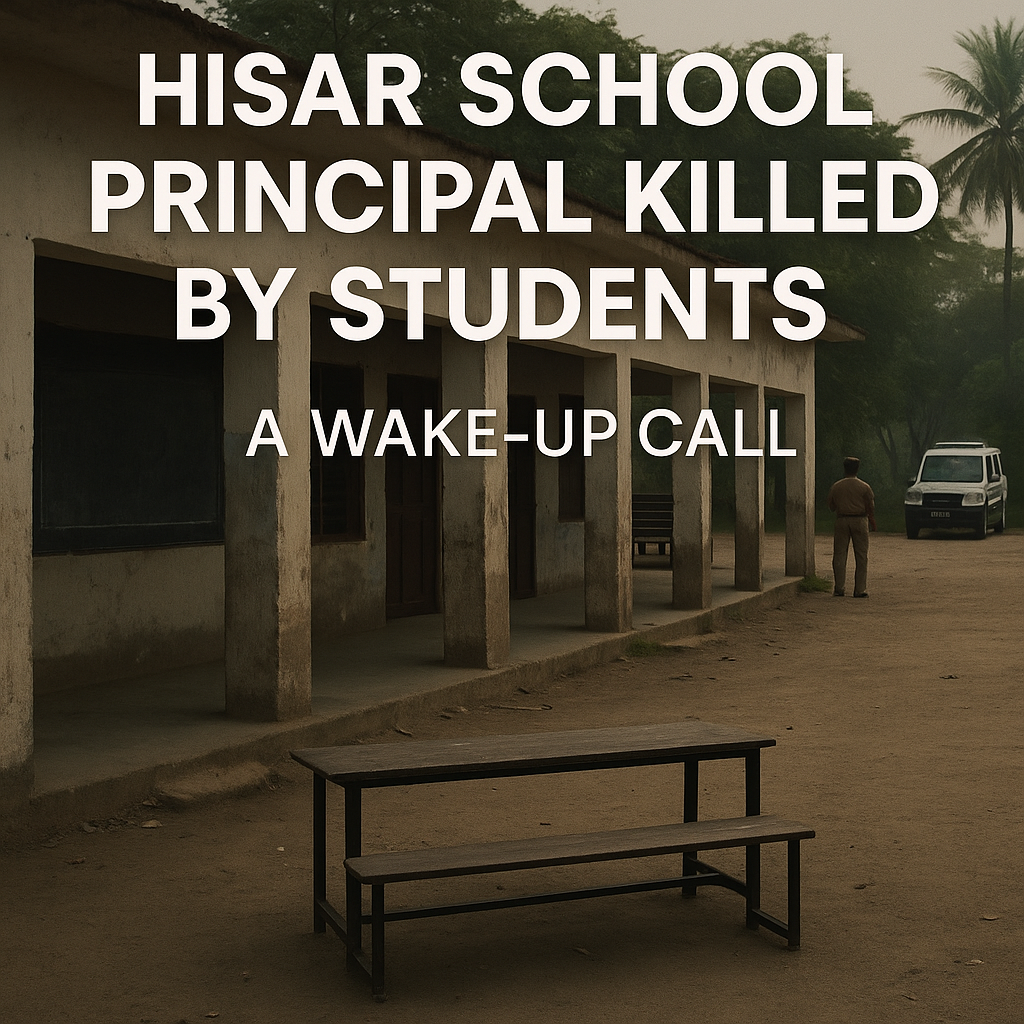In a deeply disturbing turn of events, the principal of a private school in Hisar, Haryana, was allegedly stabbed to death by two students following a disciplinary warning over their appearance. The shocking incident occurred on Guru Purnima (July 10)—ironically, a day meant to celebrate and respect teachers.
What Happened?
The victim, Jagbir Singh Pannu, 52, was the principal of Kartar Memorial Public School in Bass village, Hisar. According to police and school staff, he had reportedly asked two students—both teenagers from Classes 11 and 12—to trim their hair in line with school rules.
What followed was unthinkable. Armed with a folding knife, the students allegedly attacked Pannu on school premises. He was taken to a hospital but died from his injuries.
The two accused fled after the attack but were identified through CCTV footage. Police teams have been deployed to track them down, and a murder case has been registered.
Not Just a Haircut: A Symptom of Something Deeper
While the immediate trigger was a dispute over grooming, officials say this wasn’t the first sign of trouble. One of the students had threatened to kidnap and extort the principal’s son for ₹10 lakh, according to initial investigation reports.
This points to a more serious behavioral pattern—and raises difficult questions: Were there earlier red flags? Were they ignored or dismissed as “typical teenage behavior”?
Reactions from Teachers and Locals
The school community is in disbelief. Many teachers in Hisar and nearby regions say they now feel unsafe in their own classrooms.
“We never imagined something like this could happen here,” said one teacher who asked not to be named. “It used to be that if a teacher scolded a student, the worst we feared was a parent complaint—not violence.”
Community members have also expressed concern over what they describe as a steady erosion of respect toward educators and authority in general.
A Larger Conversation Around Mental Health and Discipline
This incident has triggered urgent calls for:
- Stronger behavioral monitoring in schools
- Mental health support for students
- De-escalation and conflict resolution training for staff
- Parental awareness programs
Dr. Richa Malik, a child psychologist based in Delhi, notes:
“Students don’t always know how to process anger or humiliation, especially during teenage years. Without guidance, some lash out—sometimes in dangerous ways.”
What Needs to Change?
This tragedy is not just about a school or two students. It’s about how we’re failing to notice and respond to warning signs in young people’s lives.
Here’s what schools and families must start doing now:
- Prioritize student mental health: Every school should have at least one trained counselor.
- Create safe reporting spaces: Teachers and students must feel comfortable flagging threats or disturbing behavior.
- Involve parents proactively: Schools can’t do it alone. Behavioral issues at school are often rooted at home.
- Balance discipline with empathy: Rules matter—but so does how we enforce them.
This Was Preventable
This wasn’t a “freak” incident. It’s a tragic reminder of what can go wrong when concerns go unaddressed. When students are unable to regulate emotion, when teachers are expected to manage everything without support, and when disciplinary action becomes confrontation instead of correction.
As the investigation continues, one thing is clear: schools must become safer—not just in terms of rules and security, but in how they help students deal with anger, pressure, and emotional distress.
Because no teacher should lose their life for asking a student to follow basic school rules.

